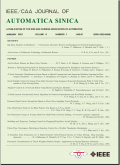自动化学报(英文版)2024,Vol.11Issue(4):946-955,10.DOI:10.1109/JAS.2023.124101
Quantization and Event-Triggered Policy Design for Encrypted Networked Control
Quantization and Event-Triggered Policy Design for Encrypted Networked Control
摘要
关键词
Cyber-security/encrypted control/event-triggered control(ETC)/networked control systems(NCSs)/semi-homomor-phic encryptionKey words
Cyber-security/encrypted control/event-triggered control(ETC)/networked control systems(NCSs)/semi-homomor-phic encryption引用本文复制引用
Yongxia Shi,Ehsan Nekouei..Quantization and Event-Triggered Policy Design for Encrypted Networked Control[J].自动化学报(英文版),2024,11(4):946-955,10.基金项目
This work was partly supported by the Research Grants Council of Hong Kong(CityU 21208921)and the Chow Sang Sang Group Research Fund Sponsored by Chow Sang Sang Holdings International Ltd. (CityU 21208921)

